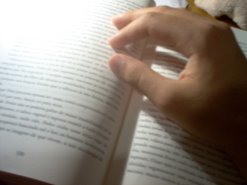BORGES
There's a book I must speak about—nothing unexpected about it—that book is Huckleberry Finn. I thoroughly dislike Tom Sawyer. I think that Tom Sawyer spoils the last chapters of Huckleberry Finn.
All those silly jokes. They are all pointless jokes; but I suppose Mark
Twain thought it was his duty to be funny even when he wasn't in the
mood. The jokes had to be worked in somehow. According to what George
Moore said, the English always thought: “Better a bad joke than no
joke.”
I think that Mark Twain was one of the really great writers, but I
think he was rather unaware of the fact. But perhaps in order to write a
really great book, you must be rather unaware of the fact. You
can slave away at it and change every adjective to some other
adjective, but perhaps you can write better if you leave the mistakes. I
remember what Bernard Shaw said, that as to style, a writer has as much
style as his conviction will give him and not more. Shaw thought that
the idea of a game of style was quite nonsensical, quite meaningless. He
thought of Bunyan, for example, as a great writer because he was
convinced of what he was saying. If a writer disbelieves what he is
writing, then he can hardly expect his readers to believe it. In this
country, though, there is a tendency to regard any kind of
writing—especially the writing of poetry—as a game of style. I have
known many poets here who have written well—very fine stuff—with
delicate moods and so on—but if you talk with them, the only thing they
tell you is smutty stories or they speak of politics in the way that
everybody does, so that really their writing turns out to be kind of
sideshow. They had learned writing in the way that a man might learn to
play chess or to play bridge. They were not really poets or writers at
all. It was a trick they had learned, and they had learned it
thoroughly. They had the whole thing at their finger ends. But most of
them—except four or five, I should say—seemed to think of life as having
nothing poetic or mysterious about it. They take things for granted.
They know that when they have to write, then, well, they have to
suddenly become rather sad or ironic.


Sem comentários:
Enviar um comentário